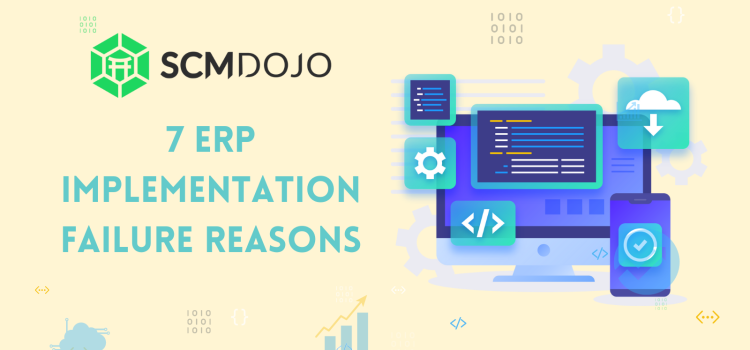With my background of 15+ years as an ERP-SAP-PROJECT MANAGER and previous 20 years in SCM both in India and Overseas. I would like to state the following ERP Implementation Failure Reasons. You will also find this article written by Dr. Muddassir Ahmed useful – 9 Drowning ERP Implementation Risk Factors You Need to be Mindful of
6 ERP Implementation Failure Reasons
1. More than 60% of the ERP Investments are not Recovering their ROI
Some customers don’t know the difference between ERP and SAP-R/3. Finer details not explained to the customer that SAP-ORACLE-MICROSOFT is all ERP. But there are many more brands of ERP systems available. Most of these famous ERP systems are overpriced and not flexible. And therefore, there are many other ERP system systems available that can be explored.
“ERP AWARENESS WORKSHOP FOR CHANGE MANAGEMENT not conducted for KEY USERS”
2. Top Management Support and Change Management is one of the Key Issues
Is the organization ready for the change? Are the employees ready and fully communicated about the reasons for the project and benefits? When implementing an enterprise resource planning (ERP) system, top management commonly faces an unwanted attitude from potential users for one reason or another, they resist the implementation process. Top management should, therefore, proactively deal with this problem instead of reactively confronting it. This is one of the most commonly reported ERP Implementation Failure reasons.
3. ROI Can Come only if ERP Objectives are Properly Defined and Quantified.
What does a return on investment look like for an ERP project? That is a very difficult question to answer. While there are many factors to consider when understanding your ROI of ERP Implementation, but in the simplest start by calculating your total cost of ownership by understanding, License fees, development/customization fee, Implementation costs, Consulting fees, and Hardware costs, if applicable.
4. ERP Selection is Also a Major Issue- Custom Built or COTS- Commercial Off the Shelf
Most companies face this question- should it be custom-built or off-the-shelf? Again the answer to this question is complex and depends on very many factors. And the choice is not a straightforward comparison. While it sounds attractive to develop a customized system based on the business model and very specific business needs, but it cost more in the long run and is dependent on the developer. There is general agreement among IT practitioners that minimizing the level of customization within any given technology system is a better way to reduce risks and costs for buyers. Too much customization is going on on the Off shelf leading to total mutilation of the original system. Upgrades become a problem if you have done too much customization and hence, being added to the list of ERP Implementation Failure Reasons.
5. Consultants Think of this as IT Project Rather than Business Transformation Project.
Consultants do not understand the Business Process of the customer and only look at the project from the IT perspective. Just hammer the system in and run away leading to a frustrating user experience. Ideally, each consultant should have min 5 YRS EXPERIENCE in their DOMAIN before becoming an ERP consultant. For example, if someone is taking lead in the Materials Management (MM) Module of SAP should have working in Materials Management for 5-7 years to understand the Materials Management Process. Actually in my first ERP company in CHENNAI we used to insist that CONSULTANTS before joining for ERP training should have at least 5 years of domain FUNCTIONAL EXPERIENCE-EITHER FINANCE-PRODUCTION-SCM-SALES- PLANT MAINTENANCE. But in today’s ERP environment we find ERP FUNCTIONAL consultants with hardly ONE YEAR in industry and getting trained in ERP implementation in their specific modules and come as CONSULTANTS for the ERP PROJECT.
Get Materials Management Technical Competencies
6. Proactive Approach Needed by Consultants.
CONSULTANTS NEED TO BE PROACTIVE IN THEIR APPROACH with the customer rather than REACTIVE. Consultants need to have a thorough understanding of the unique business process in each vertical. eg -MADE TO ORDER-MADE TO STOCK or PROCESS MFG -(FOOD AND BEVERAGES OR CHEMICAL PROCESS ) all totally different in their basic processes. But what I have seen is that Implementation consultants just see all the above as COMMON and RAM THE SOLUTION without understanding the finer points of each. For examples. Chemical process and food is based on Recipes and not BOM, Similar is the case of PRODUCTION OF FLOAT GLASS where “YIELD PER BATCH is important. Unfortunately, nobody looks at all these finer points Lastly is the ERP REPORTS. No user wants to see the STANDARD ERP REPORTS IN SAP-R/3 OR ORACLE pre-developed as STANDARD REPORTS and already available in the ERP system. They want all their OLD MIS REPORTS in the NEW ERP so the development of these reports ADDS TO THE COST OF ACQUISITION. So it is IMPORTANT for ERP PROJECT MANGER-SAP OR ORACLE to have a cope of the LIST OF ALL STANDARD REPORTS AVAILABLE in the ERP-For example- SAP- has more than 1200 REPORTS in various modules already available. BUT NOBODY BOTHERS TO SEE THEM and JUST ASK FOR NEW DEVELOPMENTS. SO COST INCREASES. The above are only some of my experience and critical factors for SUCCESS OF AN ERP IMPLEMENTATION,
We hope this article can help you lead to a successful ERP implementation, as measured by on-time and on/under-budget performance.
If you share my experience or like to add more, please mention it in the comments what do you think is the main reason for Implementation Failure Reasons
About Author
” Chandra S Gangadharan C.P.M CISA has approx 35 yrs of rich international experience in Supply Chain Management and ERP-Consulting in India, Middle East, and Far East..He has vast experience in Technology applications in Procurement -Logistics and Warehouse Management. He has in-depth experience of over 14 yrs as Head Contracts-Procurement in the Oil&Gas sector in Brunei, Oman and Qatar and worked with global Oil&Gas MNCs such as Wood Group–Houston-Oman Branch, Atlantic Power Gas Dolphin Energy Qatar .. Besides the above has worked in India in the Manufacturing-Automotive and Chemical Process sector in India as Head-Procurement and worked with Global MNC’s such as SAINT GOBAIN GLASS INDIA-Chennai He also has 15 years of hands-on experience as ERP-Practice Head in India for leading ERP-SAP-R/3 and Oracle-J.D Edwards partners in India,He managed 5 ERP- END to END implementations in SAP-R/3 and Oracle J D Edwards as Project Manager and Delivery Head and has in-depth experience in ERP-Project Management-Change Management-ERP Training and managed more than 300 ERP consultants as Profit Centre Head. Currently, he is a World Bank Public Procurement Consultant and Trainer and also CIPS-One line trainer for Level 4 and 5 ” .He has vast experience in implementing customized e-Procurement solutions both On-Premise and Cloud.”
About the Author- Dr Muddassir Ahmed
Dr MuddassirAhmed is the Founder & CEO of SCMDOJO. He is a global speaker, vlogger and supply chain industry expert with 17 years of experience in the Manufacturing Industry in the UK, Europe, the Middle East and South East Asia in various Supply Chain leadership roles. Dr. Muddassir has received a PhD in Management Science from Lancaster University Management School. Muddassir is a Six Sigma black belt and founded the leading supply chain platform SCMDOJO to enable supply chain professionals and teams to thrive by providing best-in-class knowledge content, tools and access to experts.
You can follow him on LinkedIn, Facebook, Twitter or Instagram





